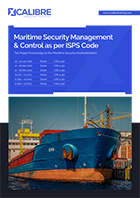| Date | Venue | Fee | |
|---|---|---|---|
| 15 Jun - 19 Jun 2026 | Dubai – UAE | $ 5,950 | Register Now |
| 07 Sep - 11 Sep 2026 | Dubai – UAE | $ 5,950 | Register Now |
| 07 Dec - 11 Dec 2026 | Dubai – UAE | $ 5,950 | Register Now |
About the Course
The International Ship and Port Facility Security (ISPS) Code is an amendment to the Safety of Life at Sea (SOLAS) Convention (1974/1988) on minimum security arrangements for ships, ports and government agencies. Having come into force in 2004, it prescribes responsibilities to governments, shipping companies, shipboard personnel, and port/facility personnel to "detect security threats and take preventative measures against security incidents affecting ships or port facilities used in international trade".
In essence, the Code considers that ensuring the security of ships and port facilities is a risk management activity. Determining what security measures appropriately assess the risks must be made in each case. The purpose of the Code is to provide a standardized, consistent framework for evaluating risk, enabling Governments to offset changes in threat with changes in vulnerability for ships and port facilities through the determination of appropriate security levels and corresponding security measures.
Core Objectives
The main objectives of this training course are to help the delegates to:
- Introduce the nature of their facility and how they are affected by the requirements of the ISPS code
- Know and understand the mandatory and guidance regulations of the ISPS code
- Develop risk assessment tools towards the Port Facility Security Assessment (PFSA)
- Build the three levels of the Port Facility Security Plan (PFSP) with enhanced knowledge of security issues
- Properly operating and interacting with the port facility security plan with the ship's security officer and ships master
Training Approach
This training course will combine presentations with instructor-guided interactive discussions between delegates relating to their interests. Practical exercises, video material and case studies aiming at stimulating these discussions and providing maximum benefit to the participants will support the formal presentation sessions. Above all, extensive use of case examples and case studies of issues has been personally involved.
The Attendees
This training course is suitable for a wide range of professionals but will greatly benefit:
- Ship Security Officers (SSO)
- Company Security Officers (CSO)
- Port Facility Security Officers (PFSO)
- Personnel with allocated security duties in the maritime and shipping industries
- Port Personnel and those designated having specific security functions and duties in a port facility
- Masters who intend to enter deeply into the port facilities security issues; personnel who will be Port Facility Security Officer
- Security Staff Members in the Port Facilities
- Personnel to operate under the ISPS regulations ashore
- All personnel who intend to participate in developing and improving the port facility security plan and system, the Port Facility Security Assessment and drawing up of the Port Facility Security Plan
- Undertake internal audits and review security activities
Daily Discussion
DAY ONE: MARITIME SECURITY BACKGROUND
- Introduction to the ISPS Code, and its relation with The International Conventions
- Understanding, Application, and Functional Requirements of the International Ships and Ports Security - ISPS Code
- Who the Code applies to?
- Sections of the ISPS Code
- The interface between Ships/Ports
- Types of Port Facilities
- Governments, companies and Ship Owners & Port Facility Operators Responsibilities
- Ship Security Officer (SSO), Company Security Officer (CSO), and Port Facility Security Officer (PFSO) General Knowledge Requirements and Roles & Responsibilities.
- Several Maritime Cases
- Developments Before and After 9/11, 2001 Legal Perspective; 2001 New IMO Maritime Security Instrument
DAY TWO: PORT FACILITY SECURITY
- Security Administration
- Security Organizations’ Responsibilities and functions
- Maritime Industry Security Threats and patterns
- Handling sensitive security-related information
- Weapons and Dangerous Substances:
- Firearms
- Low Explosives
- Incendiary Devices
- Grenades
- High Explosives
- Detonators
- Timers
- Batteries
- Timer Power Units
- Techniques used to circumvent security
- Security Equipment Systems for Ports and Ships
- Security Equipment Operational Limits
- Characteristics and behavioural patterns of persons likely to threaten security
- Security-related communications
- Searches of Persons and Luggage
DAY THREE: SECURITY TRAINING OBLIGATIONS / SECURITY LEVELS
- Drills’ and Exercises’ Requirements and Assessment
- Security Training Knowledge
- Port State Control PSC
- Declaration of Security (DoS)
- Documentation and Records
- Security Incidents Reporting
- Security Audits’ and Inspections’ Monitoring and Control.
- Non-Conformities
- Security Levels:
- Security Level 1
- Security Level 2
- Security Level 3
DAY FOUR: ASSESSMENT OF A PORT FACILITY SECURITY
- Process of Risk Management
- Requirements of Risk Assessment
- Step by Step Approach for a Port Facility Security Assessment
- On-Scene Port Facility Security Survey
- Contingency Plans and Maritime Security
- Crowd Management and Control
DAY FIVE: PORT FACILITY SECURITY PLAN (PFSP)
- PFSP General Requirements and Purposes
- Port Facility Security Plan (PFSP) Contents
- Access to PFSP and Confidentiality
- PFSP Preparation
Certificate Awarded
Upon successful completion of this training course, participants will be awarded a Certificate of Completion from XCalibre Training Centre, acknowledging their accomplishment. This certificate serves as a testament to their dedication to developing their skills and advancing their expertise in their respective fields.



